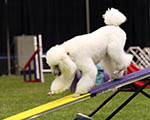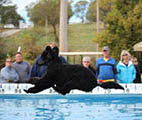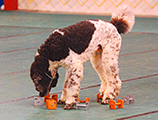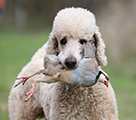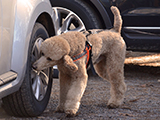Should I Breed My Poodle
Common myths about breeding:
We want to make money.
Expenses add up quickly when you have a litter. First, your female should get a general health check up by your vet, including a test for brucellosis (an incurable, infectious disease of the reproductive tract that may cause abortion in females, infection of the sexual organs in males, and infertility in both sexes).
Before being bred, your female should be tested for the genetic problems in her variety (Toy, Miniature, or Standard). Examples of these problems include hip dysplasia, progressive retinal atrophy (which may cause blindness), luxating patellas, and thyroid problems. There are other conditions for which there is not a test, such as bloat and epilepsy. Are there dogs in your female’s family that have developed any of these problems? DNA tests are available for some disorders and testing is not cheap, but you want to make sure your female is not herself affected or apt to pass a health problem on to her offspring.
Stud fees can range as high as the purchase price of one puppy. You will need to do research to locate a male that produces those desirable traits you wish to perpetuate or improve in your female. These traits include temperament and health as well as correct conformation. You may have shipping charges and boarding at the home of the stud you choose if he is not local. Who will pay for any necessary vet bills if needed while she is away?
Supplies add up, too. You’ll need a whelping box, lots of newspaper and towels, and first aid equipment for the birth. You will need toys, crates and playpens for the puppies, and equipment such as play tunnels and short ramps for building confidence.
The bitch will need a vet check after whelping, as will the puppies, and Poodle puppies generally have tails docked and dewclaws removed. They will also need at least one set of puppy shots and perhaps worming before they are old enough to leave your home. If a Cesarean section is required, that means additional expenses including possible emergency clinic costs, and perhaps your help in feeding the newborn puppies until their mother has recovered from the surgery.
The cost of food adds up, too. Your bitch will need a very nutritious food, and she’ll eat double her normal portion from the 5th week until she whelps and while nursing puppies. Once the puppies are weaned, you’ll need to feed them, also. An average-sized litter of 4-8 puppies, depending on the variety of your Poodles, eats a lot. (Part of the reason you’ll need a lot of newspaper!)
It is generally recommended (and a law in many states) that puppies stay with their mother until 8 weeks old. If you have not sold all the puppies by this age, you will have additional expenses housing and caring for them until they leave your home.
We want to get back the purchase price of our dog.
There is no guarantee you will make a profit raising puppies. There are easier ways to make money which do not require as many hours of your time as the care and supervision of newborn puppies, nor the prior expenses that health clearances cost. You will have these expenses even if your female does not conceive, or if she fails any of the tests and you do not breed her at all.
It’s the natural thing for dogs to have puppies.
Nature does not control the reproductive career of any domestic animal. In nature, only those animals that survive to sexual maturity reproduce, and many of their young do not survive. We do not adhere to ‘survival of the fittest’ when breeding our pets, but instead only breed for a reason. Reputable breeders try to better the breed by improving structural faults and breeding Poodles with good, stable temperaments who have demonstrated trainability by titling in performance venues.
Children should see the miracle of birth.
The miracle of birth isn’t actually suitable viewing for many children; it’s gory, painful for the bitch and seeing the birth may be traumatic for the child. There are books and videos made for children that show birth without the responsibility or expense of a litter of puppies. Instead, you are likely to find that the time required to clean up after and care for the puppies cuts into time you spend with your family. As the puppies grow, much time needs to be spent in keeping their box and play areas clean from urine, feces, and spilled food and water.
We want another just like her.
The puppies will be a combination of genes from their mother and father. Your Poodle is unique. It is unlikely any puppy will be an exact copy of one parent or another any more than a child is a duplicate of one parent.
We want a puppy for ourselves.
As you can see, it’s much cheaper and easier to buy a new puppy than breed one for yourself. The breeder who sold you your Poodle can sell you another, most likely related to yours. This should help ensure your new Poodle has the same qualities you love in the one you already have.
We know lots of people who want a puppy.
People may say they want a puppy from your Poodle, but when the puppies are ready and available, it is likely most of them will not want one right now; the timing is wrong, circumstances prevent it, money is too tight. Even when people put down a deposit, they can back out. The excuses are endless.
Finding good homes can be difficult and you will need to be willing to spend lots of time interviewing and educating potential buyers and assessing which will be suitable homes and which will not. You will want to be sure each puppy will be well cared for, properly trained, and placed in a home that is compatible with his personality.
Are you willing to stand behind the puppies for their whole lives? Are you willing to take a puppy back at any age if the owner can no longer keep him? Can you help new owners find obedience classes, give advice on behavioral and medical issues, and answer grooming questions (common with new Poodle owners)? What will you do if the puppy develops health issues later in life? You created this life; will you stand behind him for his entire life?
She needs a litter… or… it will calm him down.
Not true. Hormones determine sexuality in animals. Animals do not miss what they never experience. Dogs settle down with maturity and training. Females do not need a litter; neutered males are less distracted by their environment and less likely to demonstrate undesired behaviors such as marking.
If you do decide to breed your Poodle:
Do your research in order to do a good job.
- Go to http://www.vipoodle.org/ to find out what tests are needed for your variety and where to have those tests administered.
- Read the other educational materials at the vipoodle website at http://vipoodle.org/.
- Check the Poodle Club of America’s web site at https://www.poodleclubofamerica.org/pca-the-club/affiliate-clubs/affiliate-club-info to find a Poodle club in your area. Study the web site to learn more about the benefits of joining a local club.
- Join a local poodle club or local all breed club to meet and learn from other serious breeders
- Subscribe to dog magazines such as Poodle Variety, Poodle Review and the AKC Gazette.
- The Poodle Club of America has a written and illustrated breed standard of perfection for Poodles. The breed standard describes and illustrates how the ideal Poodle should look, move and The standard is on AKC’s website at http://www.akc.org/breeds/poodle/.
- Find a mentor, someone who already has years of experience breeding and who is willing to spend the time with you to answer questions and help you find the right dog to complement your female. This might be your Poodle’s breeder, a member of a club, or an experienced breeder with a different breed of dog. Dog shows are a good place to get to know the people and breeders who show Poodles.
A good breeder continually compares her dogs against the breed standard to decide whether or not to breed. Good breeders show their dogs in the conformation ring so that their dogs’ structure can be evaluated by others. Breed standards aren’t easily understood in one reading. It takes study, and exposure to hundreds of dogs, before you can really see why certain characteristics are important and whether or not your dog has them to such a degree that breeding it would improve the overall quality of the entire breed. Other breeders exhibit in various performance events to prove the trainability of their Poodles and to demonstrate they still have correct breed temperament.
Many dogs end up in shelters because someone wanted to have a litter for fun without realizing the responsibility it entailed. Unfortunately, many of these dogs are euthanized each year. If you are not 100% committed to breeding the best Poodles you can, raising the litter to the best of your ability, finding the best homes for them, and staying in touch with your puppy buyers, puppies you breed may meet this fate.
If you breed a litter, you and the stud dog owner are responsible for each puppy for its entire life. If a puppy comes back to you, you are responsible for maintaining the puppy or finding another home for it. You will have to be continually vigilant that none of your pups end up in shelters or in bad homes.
You will need to learn how to write and enforce a contract for new owners to follow to assure your expectations for each puppy’s care is met.
AKC registration requirements:
Maintaining accurate records is important when your pups are registered with AKC. If a question arose as to the breeding, parentage, etc., you will want to have the appropriate documents. As a breeder, you need to follow AKC’s guidelines to the letter. AKC reserves the right to inspect your records. If they do not meet their standards, they can refuse to register your puppies, impose a fine or even suspend you from all AKC privileges. For more information on registration requirements, responsible ownership or to find the dog clubs closest to you, check AKC’s website at http://www.akc.org.
The information contained in these documents is current at the time of this writing and is accurate to the best of VIP’s knowledge.
This information has been provided to you at no charge. You are free to use it provided it is used in its entirety with no changes or alterations and that the copyright remains intact. If you have found this information to be helpful, please consider making a tax-deductible donation to:
Versatility in Poodles
4061 Highlands Rd
Franklin, NC 28734
To make a donation via PayPal, please click the Donate Button:
![]()
The contents of the www.vipoodle.org website, such as text, graphics, images, and other material contained on this site (“Content”) are for informational purposes only. The Content is not intended to be a substitute for professional veterinarian advice, diagnosis, or treatment. Always seek the advice of your veterinarian with any questions you may have regarding the medical condition of your pet. Never disregard professional advice or delay in seeking it because of something you have read on this website!
If you think your pet has a medical emergency, call or visit your veterinarian or your local veterinary emergency hospital immediately. Versatility in Poodles and www.vipoodle.org do not recommend or endorse any specific veterinarians, products, procedures, opinions, or other information that may be mentioned on this website. Reliance on any information appearing on this website is entirely at your own risk.



